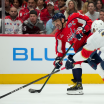As NHL scouts continue to place a premium on puck-moving, mobile defensemen, a case can be made that the classic stay-at-home, big-bodied, shutdown defenseman is becoming obsolete.
Brooks Orpik is among the exceptions. A key cog during the Capitals' Stanley Cup run last spring, Orpik has proven both reliable and durable throughout his 16-year NHL career. He is slated to play his 1000th career game Monday against St. Louis.
Road to 1,000
Despite adapting to a new style of play, Brooks Orpik's physical presence is felt as he inches towards 1,000 games
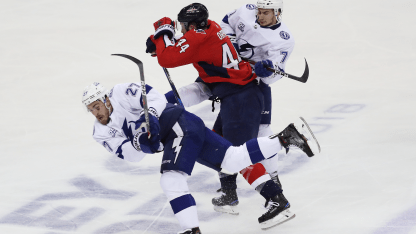
By
Ben Raby @BenRaby31 / WashingtonCaps.com
"Because of my style of play," Orpik says, "it's something to be pretty proud of."
In some ways, Orpik is a throwback. At 6'3", 217-pounds, Orpik has made a career delivering bone-crunching hits, blocking shots and clearing the crease.
Although Orpik can make the occasional offensive contribution (see his game-winning goal in Game 2 of last spring's Stanley Cup Final), he is paid to defend. And in an age where the NHL is constantly looking for ways to boost offense and allow younger (and sometimes smaller) players to showcase their speed and skill, that can be a challenge.
"He's a little bit of a dinosaur because he hits and there isn't a lot of hitting in the game anymore," says Blue Jackets head coach John Tortorella, who worked with Orpik at the 2010 Olympics.
"But I like the way he plays… He plays the game hard. He plays the game the right way."
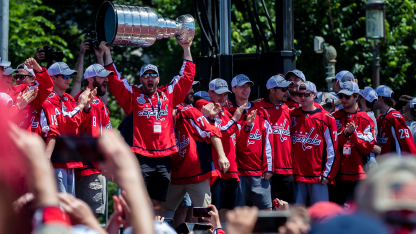
While Orpik has made a career as a stay-at-home defenseman, he says the key to getting to 1,000 career games has been his ability to evolve.
"You definitely have to be able to adapt," says Orpik, who made his NHL debut with the Penguins in December 2002.
Back then, he says, defensemen could get away with clutching and grabbing and relying on their size to neutralize an opposing forward. But when the league introduced new rules in 2005 to limit obstruction, blueliners across the NHL were forced to adjust.
"You had to be able to skate," he says. "It put a premium on skating and a lot of guys got pushed out [of the league] because of that. I guess the thing I'm most proud of is getting to 1,000 games, but doing it with the style I play. It hasn't been easy."
There is no denying that Orpik has had to put in the work and make appropriate decisions to prolong his career. Besides the time spent at the gym and the strict diet that he lives by, Orpik says that an emphasis on mobility during offseason training programs has provided some staying power.
"The last third of my career, I've definitely been making a lot of sacrifices in terms of health and nutrition and taking care of myself better," he says. "If I didn't make those adjustments, I would have been out of the league a long time ago."
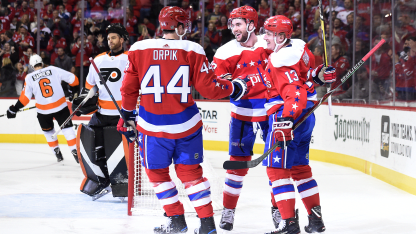
Orpik's NHL journey began with the Penguins, who selected the Boston College defenseman in the first round of the 2000 NHL Draft. While the following years saw the rebuilding Penguins draft headliners Marc-Andre Fleury, Evgeni Malkin and Sidney Crosby, Orpik emerged as a steadying force for a young team on the rise. A case could be made that while Orpik was ahead of his time with his elaborate training and nutrition programs, the physical nature of his game had an old-school feel to it.
"For a guy that played the game the way that he did, he was a bull on the ice," says former Penguins teammate Colby Armstrong, now an analyst with Rogers Sportsnet. "He was fast, he was strong, he was mean and he was on another level with how he treated his body.
"I can always remember the first time I saw him and how jacked he was. He was the first guy that I saw where I thought, 'Oh boy. This guy is coming out of college looking like this? What the heck is going on?' I always said, Brooks to me, he looked like Eman- he had the long blond hair he was ripped up like a bad report card."
Armstrong and Orpik came up together with the Penguins in the early 2000s. Armstrong still remembers the annual tradition of scanning the rosters before intrasquad scrimmages during training camp and crossing his fingers that Orpik would be on his side.
"He was the one guy that really scared me," Armstrong says. "He was the one guy that when he hit you, it really hurt. And he wasn't cheap. I'd look at the rosters of the intrasquad games and I'd be like, 'Please have Brooks on my team! Please have Brooks on my team!' He was the only guy at camp, I did that with… He's a presence and a guy who even early in my career I was like, 'Thank G-d that guy is on my team.'"
Former NHL defenseman Hal Gill, who played more than 1100 games across 16 seasons and was no stranger to a rugged game himself, was among Orpik's teammates with the 2009 Stanley Cup champion Penguins.
"When we went on Cup runs, he was just a beast," says Gill, who now works with the Nashville Predators Radio Network. "When I was playing with him in Pittsburgh, it wasn't three or four hits a game- it was three or four hits a shift. Just a solid guy. As a person, very mild mannered, very calm and collected, but he had that edge to him and you can still see it runs deep."
Orpik turned 38 in September. He smiles at the thought of comparing his offseason training program to what he saw from some NHL veterans when he first entered the league. Orpik remembers some of the more seasoned players taking their summers off and just doing a handful of hard skates in the days before training camp.

"It's funny for me," he says, "but I'm at an age now where I'm still doing power-skating work in the summer and doing skill development in August. But you have to."
Orpik has an offseason home in suburban Boston, where he takes part in a summer program with noted skating and skills coach Adam Nicholas. Bruins defenseman Zdeno Chara, 41, is also one of Nicholas' clients.
"You've got to really work at keeping your foot speed at a certain level," Orpik says. "We work on that. Obviously that decreases with age, but you try to maintain it as best as possible."
"With the speed of today's game, if you can't skate, if you can't keep up with the guys, you can't play," says Gill, who retired in 2014.
"You can't grab them on the way by and you can't use your strength. I know Brooks was a guy who was so strong that he could just overpower guys, but now you can't throw that extra hand out to overpower someone… You have to use your skating to get into position. Credit Brooks that he's been able to do that."
Capitals head coach Todd Reirden has known Orpik for nearly a decade, having previously worked with him while an assistant coach in Pittsburgh.
Reirden recently brought up one of Orpik's most memorable shifts - a six-hit outburst against Detroit during the 2008 Stanley Cup Final - but acknowledged that these days Orpik picks his spots.
"Right now," Reirden says, "a lot of forwards are hoping you try to finish them and take yourself out of the play. Teams are better offensively at creating down low. I think it's the development of the offensive player which has forced you to be able to defend first with your stick and then if you have a chance, to separate physically. He's evolved with the game.
"It's a credit to the choices he made off the ice, the way he studied the game, watching video and putting time in and trying to be cutting edge with a lot of different things."
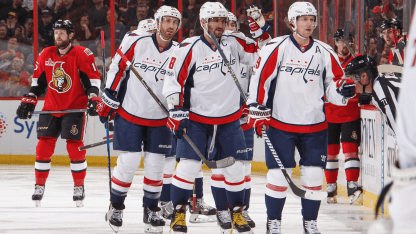
Orpik has also stayed remarkably durable despite playing demanding minutes throughout his career. Since becoming a fulltime NHLer during the 2003-04 season, Orpik ranks second in hits and third in blocked shots. He has also played the most playoff games (149) among defensemen in the last 15 years.
"Everybody plays just a little bit bigger when he's on the ice," says Matt Niskanen, teammates with Orpik in both Pittsburgh and Washington since 2011.
"He's not a perimeter player. He plays hard minutes and he plays without any cheat in his game. He's been on several teams that have made deep playoff runs so there are a lot of extra games where those are hard games too. It's amazing how resilient and reliable and durable he's been."
While the Capitals and Penguins maintain a fierce rivalry, there's no denying that both franchises have been the class of the Eastern Conference for the last decade. It's no coincidence that Orpik has been an integral piece for both.
"The game may be changing, but there's always room for competitors," says former Penguins general manager Craig Patrick. "Brooks is as competitive as they come. He can play too, but he's as dedicated and as competitive as they come."
Orpik played all 24 postseason games last spring and was fittingly the first to receive the Stanley Cup after franchise stalwarts Alex Ovechkin and Nicklas Backstrom each had their turn. As the only player on last year's roster who had previously won the Stanley Cup, Orpik was the calming voice throughout the playoff run.
After big wins and series victories early in the spring, he'd remind his teammates not to get too high- bigger goals were still in front of them. He also offered perspective to some of his youngest teammates, reminding rookies like Jakub Vrana to savor and take advantage of the moments as they could ultimately be limited in a lengthy NHL career.

"I don't think you can underestimate how valuable he was," says Braden Holtby. "He did a phenomenal job keeping our group on the right path throughout the playoffs."
Now in his fifth season in Washington, Orpik has returned from early-season knee injury and remains a fixture on the penalty kill and in late-game situations when the Capitals are trying to protect a lead.
"He may not wow you or pull you out of your seat," says former Penguins teammate Mike Rupp, now an analyst with the NHL Network. "But at the end of the day, you ask any coach in this league, you throw number 44 over the boards, you know what you're going to get."
Red Wings assistant coach Dan Bylsma spent parts of six seasons as Orpik's head coach in Pittsburgh and was most impressed with the impact that Orpik had on his teammates. Although Orpik was never a captain in Pittsburgh or Washington (generational talents Crosby and Ovechkin sport the 'C's) he's been a tremendous leader for both clubs.
"Almost to a man, every player or coach that went through Pittsburgh cites Brooks Orpik as the model example of a pro and being a pro and how to play the game," says Bylsma.
"Maybe more than any player I've coached, he has the ability the hold players accountable to that [high] standard with who he is and how he acts and the words he says. Whether it's the top dog or a whether it's a rookie walking through the door at training camp, he has the ability to do that. And he does."
It's that workmanlike approach and the influence that he has on his teammates that drew the Capitals to Orpik in 2014. After missing the playoffs the previous season and going through 14 different defensemen, the Capitals signed Orpik to a five-year contract.
"It couldn't have worked out any better from my perspective," says general manager Brian MacLellan.
"He was a big part of the culture change," says Reirden, who helped recruit both Orpik and Niskanen to Washington given their prior relationships from Pittsburgh.
"I had done some research and knew they wanted to change some things culturally and I knew he'd be a great add to the locker room in terms of how he goes about his off-ice training and the choices he makes… He's a consummate professional and a great role model for our players."
Adds MacLellan: "I think it was invaluable what he has brought and continues to bring to our organization and it's helped establish where we're at cultural wise now which it wasn't there when he first came in so I think he's been a big part of it.









